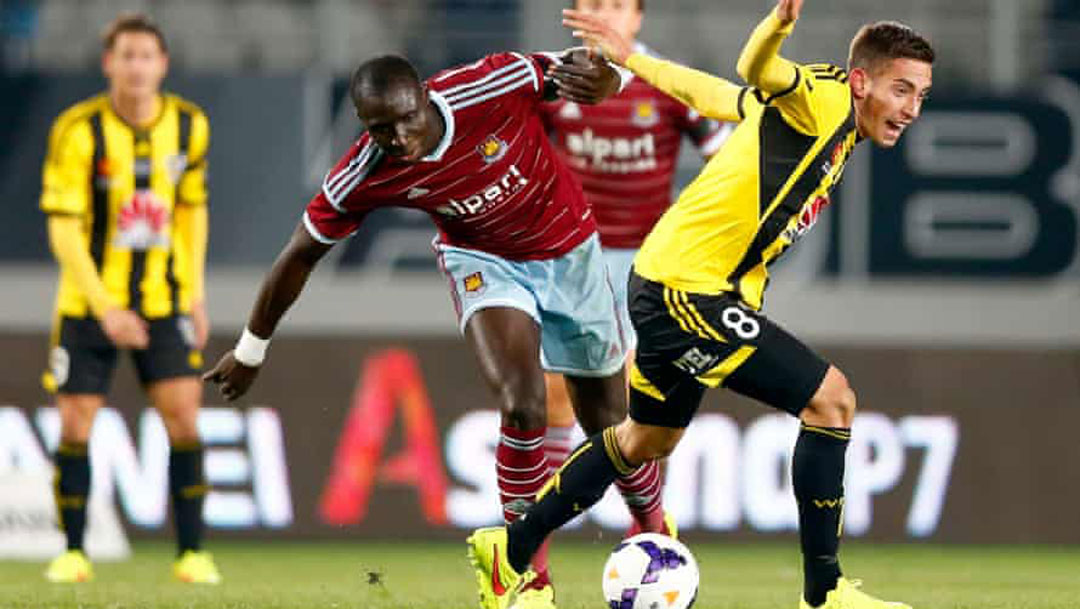
We continue our alphabetic journey through 125 years of West Ham United history by meeting a prolific, if short-lived, striker and taking trips to New Zealand, Nigeria and North America...
Frank Neary
Few, if any, players in the history of West Ham United have found the net as regularly as Frank Neary.
The Aldershot-born centre forward scored an amazing 15 goals in just 17 appearances for the Hammers between February and September 1947, bagging one hat-trick and scoring twice in a match on no fewer than five occasions.
The aforementioned hat-trick came along on 15 March 1947 in a 3-2 home Division Two victory over West Bromwich Albion. Neary had joined the Hammers from Queens Park Rangers for £4,000 in January of the same year, replacing Joe Payne, who had departed for Millwall.
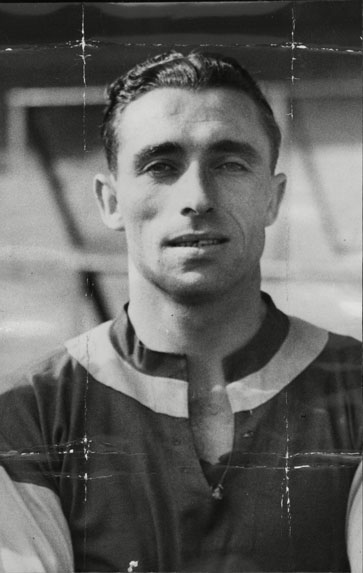
Neary made an electric start to his career in claret and blue, scoring twice in 3-0 home wins over Newport County and Swansea Town before hitting his treble against the Baggies. The former Army PT instructor ended the 1946/47 campaign with 15 goals in 14 league starts.
After playing three times at the start of the following season, during which he failed to score, Neary departed for Division Three South club Leyton Orient for a fee of just £2,000. Rumours abounded of the reasons for his sudden exit, with one story that emerged following his death suggesting the forward had been allowed to leave after an on-field altercation with an opponent was spotted by Chairman WJ Cearns.
Whatever the truth of the matter, Neary departed, but the goals continued to flow - 44 in 78 league appearances for Leyton Orient, five in 19 for QPR and 50 in 123 games for Millwall. On dropping into the non-league ranks, he bagged 17 in the same number of matches for Gravesend before hanging up his boots in 1954.
New Zealand
West Ham United made the 11,500-mile journey to New Zealand for a two-match ‘Football United’ pre-season tour in July 2014.
Sam Allardyce’s squad flew from London to Auckland, training at the city’s North Harbour Stadium before taking on A-League side Wellington Phoenix at the iconic Eden Park - home of the All Blacks rugby union team.
Despite fielding a strong team featuring the likes of New Zealand national-team star Winston Reid, Kevin Nolan, Mohamed Diame, Carlton Cole and Matt Jarvis, Ernie Merrick’s side ran out 2-1 winners, with goals from Andrew Durante and Alejandro Gorrin rendering Mauro Zárate’s 25-yarder a mere consolation.
Three days later, the Irons took on another A-League opponent in Sydney FC at another stadium more regularly associated with rugby union than football – the Westpac Stadium in New Zealand’s capital city, Wellington.
There, two goals from Cory Gameiro and one from Alex Brosque condemned West Ham to another defeat, this time by three goals to one. The Hammers’ consolation was an own-goal scored by Nikola Petković.
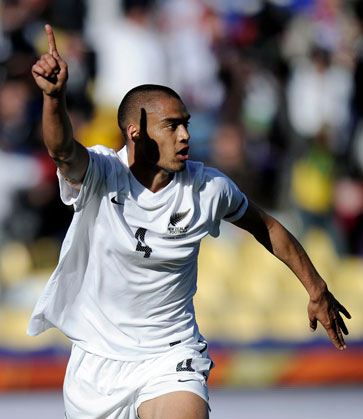
It was not all doom and gloom, though, as supporters from across Australia, New Zealand and beyond turned out to cheer on and meet their heroes, including members of the famous All Blacks rugby union team.
Meanwhile, the squad also took the opportunity to visit the famous Weta Workshop and Park Road Post-Production film studios, where they met characters from The Lord of the Rings trilogy, The Hobbit and King Kong, as well as double Oscar-winning sound engineer Michael Hedges.
Reid is the only New Zealander to turn out in a first-team fixture for the Hammers. The defender was born in the Auckland suburb of North Shore before emigrating to Denmark as a boy and joining FC Midtjylland.
However, he represents the country of his birth in international football and made his name at the 2010 FIFA World Cup finals in South Africa.
There, Reid helped the All Whites draw all three group-stage matches, scoring a last-minute equaliser to secure a 1-1 draw with Slovakia and a first-ever World Cup point for his nation.
For West Ham, Reid has made 222 first-team appearances, scoring ten goals, including the historic final goal in Boleyn Ground history against Manchester United in May 2016.
Nigeria
West Ham United have been represented by a number of Nigerian-born footballers during their 125-year existence.
The first was Ade Coker, who was born in Lagos in 1954 and moved to London at the age of eleven. A forward, Coker scored on his debut in a 3-0 First Division win at Crystal Palace in October 1971, aged just 17, and went on to net three times in eleven first-team appearances.
He later moved to the United States in 1974 (see North American Soccer League) and became a USA international.
Victor Obinna spent the 2010/11 season on loan at the Boleyn Ground from Inter Milan.
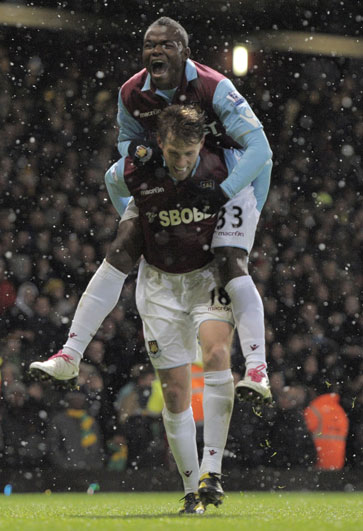
The enigmatic forward scored just three Premier League goals in 25 appearances, including two in a 3-1 win at Blackpool, in February 2011, having netted a hat-trick in an FA Cup fourth-round win over Nottingham Forest at the Boleyn Ground the previous weekend.
Obinna had also supplied assists for all four goals in the memorable 4-0 League Cup fifth-round win over Manchester United in the east London snow in November 2010, before being sent-off in the semi-final first leg against Birmingham City!
Victor Moses was loaned to West Ham by Chelsea for the 2015/16 season and highlighted his year-long stay in east London with a rasping strike in the 2-1 Premier League win at Manchester City in September 2015.
Moses’ international teammate Emmanuel Emenike also spent the 2015/16 season on loan with the Irons, from Turkish club Fenerbahçe. The striker failed to score in 13 Premier League appearances, but did manage a brace in the 5-1 FA Cup fifth-round win at Blackburn Rovers in February 2016.
While he was not born in Nigeria himself, current defender Angelo Ogbonna was raised in Italy by Nigerian parents, while former striker Carlton Cole has Nigerian heritage, as does current Academy goalkeeper Daniel Jinadu.
North American Soccer League
The star-studded North American Soccer League (NASL) was launched in December 1967 and last for 18 seasons before folding in March 1985.
For much of its existence, the NASL was headed by former West Ham United forward Phil Woosnam, who had emigrated to the United States in 1966, becoming head coach of the United States national team in 1968.
Welshman Woosnam became NASL Commissioner in 1969 and is credited as an important figure in the development of the league in the 1970s, when it attracted a succession of the world’s leading players, including Pelé, Eusébio, Franz Beckenbauer, Johan Cruyff, Carlos Alberto, George Best, Gerd Muller, Ruud Krol, Johan Neeskens, Rob Rensenbrink, Gordon Banks and Woosnam’s former Hammers teammates Bobby Moore, Geoff Hurst and Harry Redknapp.
Hurst made 23 appearances for the Seattle Sounders during the 1976 NASL season, while Moore represented the same club seven times during the 1978 NASL campaign. England’s 1966 FIFA World Cup-winning captain had earlier turned out for the San Antonio Thunder in 1976. Redknapp also turned out for the Sounders from 1977 to 1979.
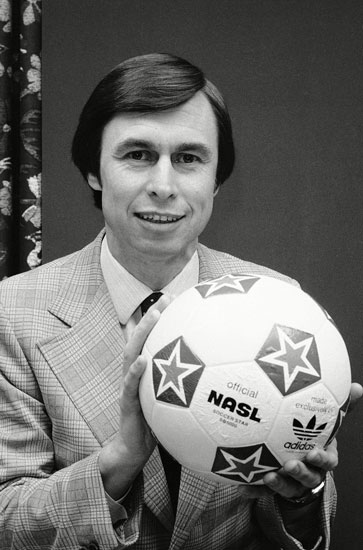
A fourth former Hammer, forward Ade Coker, moved to the NASL in 1974, when he joined the Boston Minutemen, initially on loan.
The Nigeria-born Coker went on to play for the Minnesota Kicks, San Diego Sockers and Rochester Lancers, while also featuring for the New York Arrows, Baltimore Blast and St. Louis Steamers indoor football clubs.
Coker was capped five times by the United States in 1984, scoring three goals against Netherlands Antilles and Colombia.
A fifth ex-West Ham player, Academy of Football graduate Clive Charles, joined Montreal Olympique in 1971, again initially on loan, before returning in 1978 to spent three seasons with the Portland Timbers.
Defender Charles remained in the United States after retiring as a player, coaching a high school team in Troutdale, Oregon before taking on the same role at the University of Portland.
Charles coached the national Under-20 women’s team between 1993-95, the men’s U23 side between 1996-2000 and served as assistant to men’s senior national team head coach Steve Sampson between 1995-98. He also worked as a commentator for broadcaster ESPN during the 1994 FIFA World Cup, which was hosted by the US.
Sadly, Charles passed away in 2003, three years after being diagnosed with prostate cancer.
And, last but not least, Bermuda-born centre-forward Clyde Best is another who spent the latter part of his career in America.
Best, who joined the Hammers in 1968, aged 17, and scored 58 goals in 218 appearances in Claret and Blue, moved to the Tampa Bay Rowdies in 1975.
He then scored 38 NASL goals for Portland Timbers, briefly returning to Europe with Dutch club Feyenoord on loan, before seeing out his career with Toronto Blizzard and indoor clubs Cleveland Force and Los Angeles Lazers. Best remained in the States, where he coached San Diego Sockers in the early 1990s, before returning to Bermuda.
